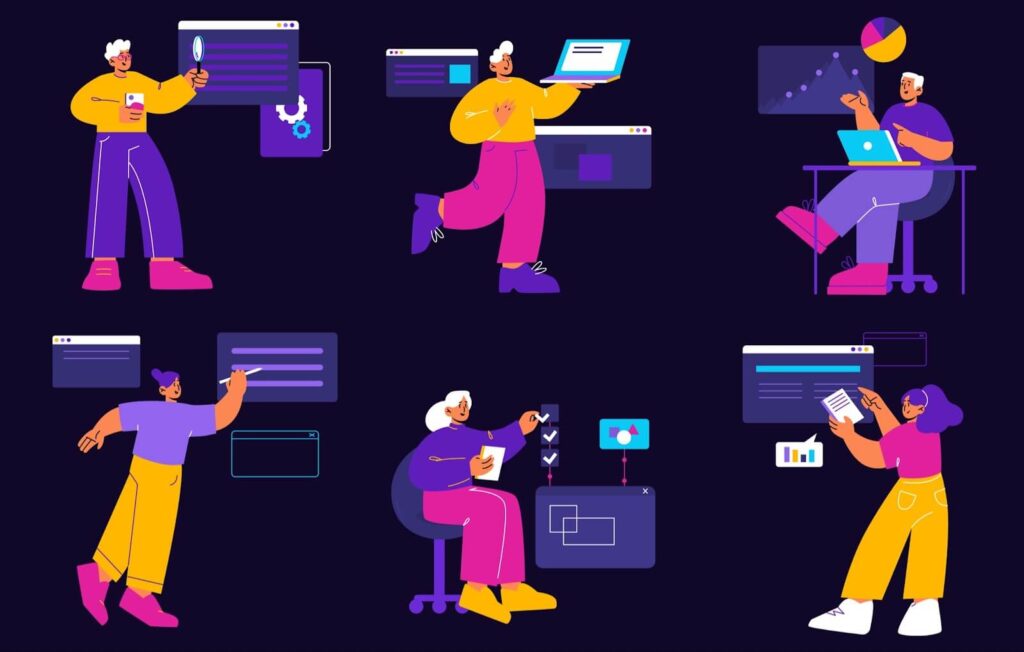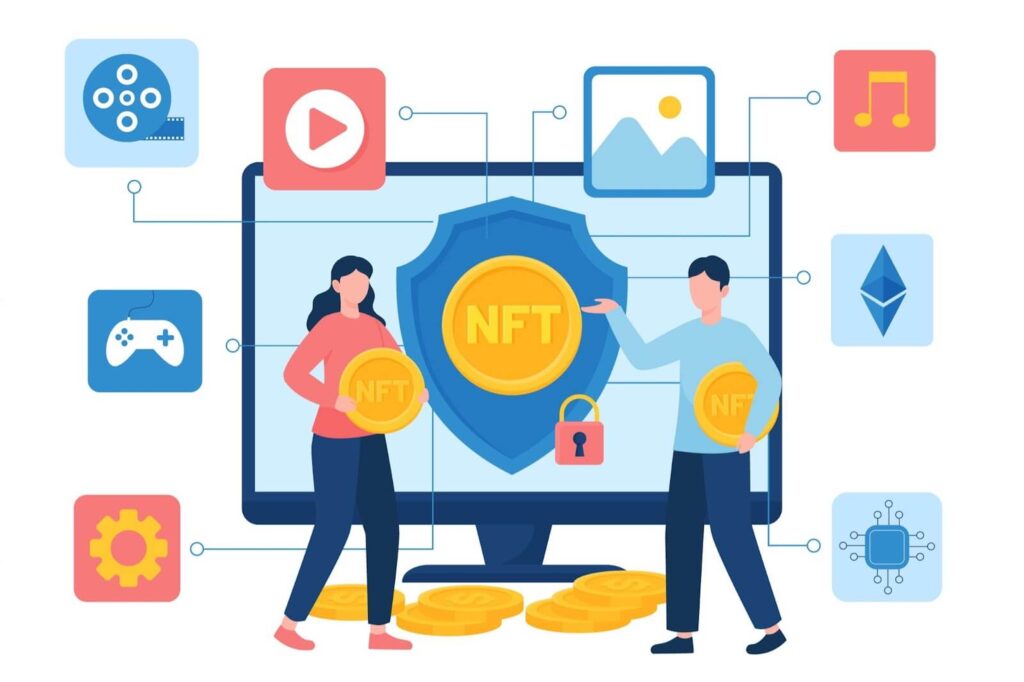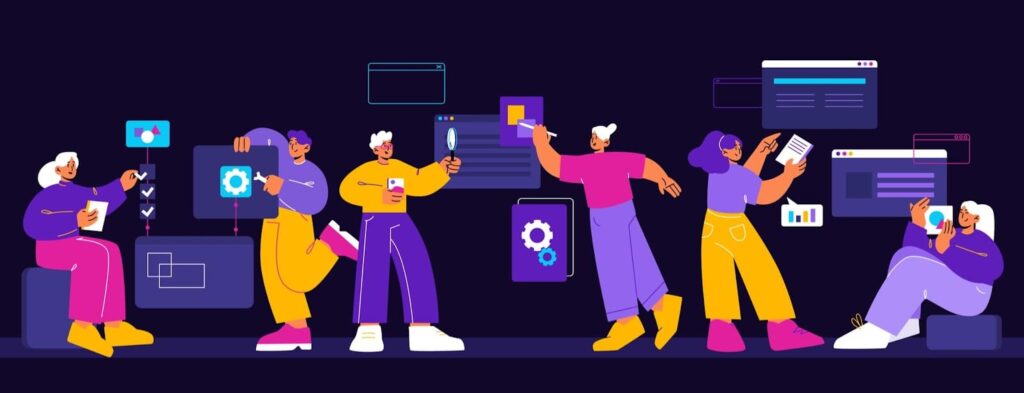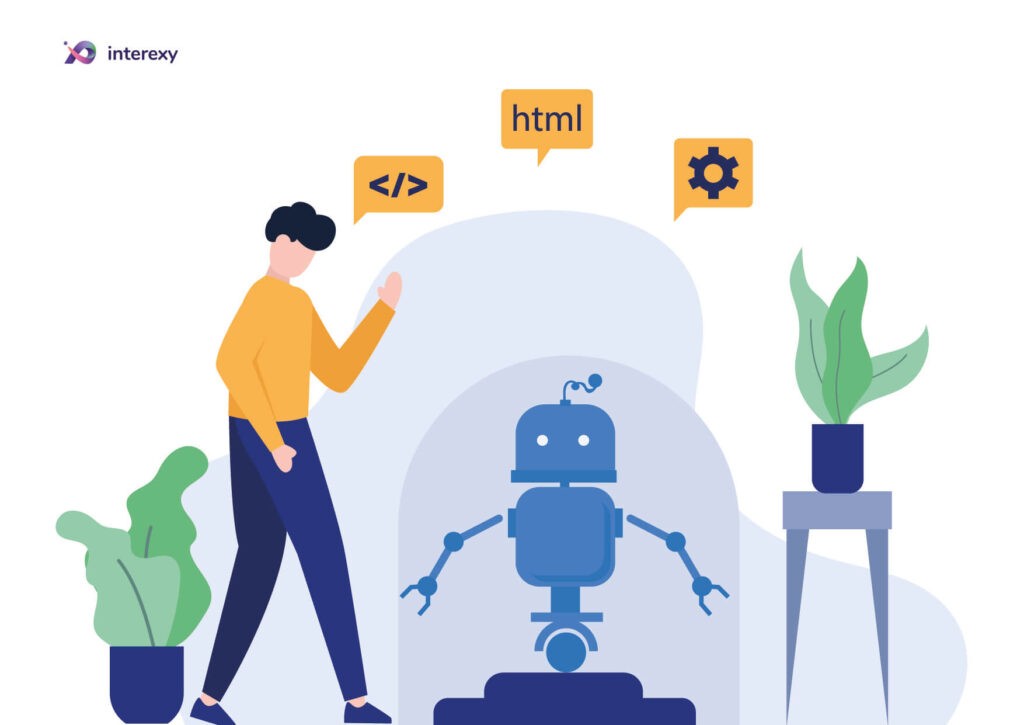August 24, 2022
What Is A DAO-enabled NFT Platform And How They Are Changing The World Of Blockchain
Table of content
- What Is A DAO-enabled NFT Platform And How They Are Changing The World Of Blockchain
- What Is DAO (Decentralized Autonomous Organization)?
- How Does A DAO Work?
- How is DAO Connected With NFTs?
- What is a DAO-enabled NFT Platform?
- Types of DAO-enabled NFT Platforms
- Benefits of DAO-Enabled NFT Platform Development
- Examples of DAO-enabled NFT Platforms
- How Can Interexy Help?
- Final Thoughts
- FAQs
It’s surprising to see how JPEG images, video clips, and memes are becoming increasingly popular in 2022 and will raise millions of dollars. Modern people are obsessed with purchasing digital property and selling virtual clothes, jewelry and houses. The NFT market is growing rapidly, driven by an overwhelming demand for non-fungible tokens. Statista shows that the total NFT market cap is projected to reach US$2,520.00 million in 2022.
Experts from DappRadar also predict that the value of revenue would exceed $35 billion by 2022 and $80 billion by 2025. NFTs are now redefining different industries through digital asset tokenization, providing amazing opportunities for a vast range of people, such as traders, investors, and enterprises worldwide. Every day NFT people sell and buy millions of NFT.
However, there are several types of NFT platforms, each providing unique opportunities. Some NFT platforms only allow users a place to show their NFT collections and trade them. Other platforms allow users to play games with their NFTs, mint tokens using the -in-game assets, or even earn NFTs by playing.
Even though the market has already reached millions in revenue, the NFT industry is still in its development stage. As a result, more and more ideas are coming to this space where developers and enthusiasts bring the latest innovations and technologies. For example, modern NFT platforms are now using the decentralized autonomous organization (DAO) model regardless of the purpose they are designed for.
DAO has been added to help NFT platforms fight the bureaucracy and overcome its potential outcomes. DAO-powered platforms are developed with a focus on users’ interests, sharing the regulatory power among users according to the NFTs or tokens they have on the platform.
DAO also supports the latest NFT-based concepts like play-to-earn and Metaverse marketplaces. This is why experts believe that DAOs will soon change the next-gen blockchain infrastructure. Let’s explore what DAO means and how exactly it can benefit the blockchain world.
Related: Check our blockchain development services.

What Is DAO (Decentralized Autonomous Organization)?
The term DAO can be broken up into its individual letters, which show the meaning. Being a decentralized organization, a DAO is community-led. Theoretically, there should not be any central, hierarchical structure in a DAO.
Being an autonomous organization, DAO works on an open-source blockchain protocol. DAOs are powered by cryptocurrencies known as governance tokens, which work as membership cards. And these cards are essential to upkeep and maintain DAOs.
DAO is usually described as a place gathering people that share similar interests with no central leadership. Even though the critical functions of DAO always depend on the community, most modern DAOs revolve around investments and socialization.
How Does A DAO Work?
In 2022 any organization can work as a Decentralized Autonomous Organization. There are three integral elements of a decentralized autonomous organization that you can see below:
Smart Contracts
First of all, the development team, along with members, should create a set of rules through smart contract development. Smart contracts can be deployed on any blockchain. Even though the Ethereum blockchain has long been the preferred option for many years, its high gas fees force developers to choose other options.
These smart contracts set the foundational rules and frameworks following which the DAO will work. Therefore, these contracts self-execute only when the criteria are met. Once the founding team creates rules through smart contracts, changes can be made only by community members based on the governance system of the DAO platform.
Funding
Once the first stage is done, the DAO platform should choose how to receive investments and carry out governance. This is why the development team creates specific governance tokens that also represent a share of the organization. The platform gets funding by selling those tokens through public or private offerings. Those buying tokens receive voting rights in exchange for their money. The voting rights vary depending on the number of tokens the user holds.
Deployment
At this stage and further, no one except those who developed the initial smart contracts can interfere with or change the rules of the DAO. Therefore, the community who have bought tokens choose the future of the DAO platform.
How is DAO Connected With NFTs?
To put it simply, NFT is a digital asset, and DAO is a place that collects communities related to NFTs. In addition, NFT and DAO alike emphasize ownership; where NFT gives ownership to creators, DAO allows for governance. NFT creators provide a piece of art, house, music, and other content on the blockchain. The blockchain ledger guarantees not only the authenticity and security of the digital assets but also the ownership of buyers.
DAO helps the NFT industry by providing its decentralized community governance. This is why AO and NFTs are combined to create a strong decentralized media, making investments available on the Internet. NFT creators come together through DAO, which can be divided into two categories: individual and collective.
What is a DAO-enabled NFT Platform?
All NFT platforms are typically able to enable a DAO by integrating specific smart contracts following the required set of rules. Most well-known DAO-enabled NFT apps like NFT marketplaces, NFT gaming platforms, NFT staking, and NFT-based Defi platforms greatly benefit from their powerful decentralized communities. The profits that NFT platforms make are returned to the system to maintain its efficiency while also contributing to the liquidity pool.

Types of DAO-enabled NFT Platforms
There are several types of DAO-enabled NFT platforms, including the following ones:
Operating System DAO: These platforms help establish DAOs for other organizations.
Protocol DAO: They bring new changes to a business by performing their voting mechanisms.
Investment DAO: These platforms are designed for Defi platforms, and they are used to support their operations related to pooling and funding.
Service DAO: They help companies recruit new candidates through efficient regulation and execution.
Collector DAO: As the name implies, these platforms are used by businesses to provide collective ownership and fractionalization for NFTs.
Social DAO: Designed to support, manage and regulate decentralized social media platforms.
Benefits of DAO-Enabled NFT Platform Development
Ownership
DAO platforms give users the right to leverage authority for policy reviews related to most things happening on the platform, like content changes, assets policy, and auctions. Since DAO platforms are autonomous and packed with NFTs smart contracts, they represent the concept of leadership throughout every NFT platform.
Voting Power
In contrast to regular NFT platforms, DAO-powered NFT platforms offer various governance models and ownership policies. When users buy a token and become an essential part of the internal decision-making process, three stages can be followed – proposals, total submitted votes, and outcomes.
Complete Decentralization
Thanks to the completely decentralized nature of DAO platforms, users don’t need to worry about the hierarchy-structured infrastructure or authority that can bring modifications to the platform without considering their consent. This is because DAO platforms are designed to give users authority and remain an integral part of the key decision-making processes.
Stake and Earn
NFT platforms allow users to earn while staking native tokens and NFTs. This brings benefits for both sides – users and the marketplace regardless of liquidity. This has become the key reason for more users and businesses stepping into the DAO ecosystem of NFT platforms.
Review Policies
Everyone token holder has access to review all the policies and rules based on which the NFT marketplace operates. In addition, token holders can also propose any changes or modifications to the platform. DAO allows users to participate in related NFT marketplace events like NFT drops, launches, minding, sales, community promotions, and so on.
Examples of DAO-enabled NFT Platforms
1. APE DAO
Kylo.eth, the collector of Bored Apes, started APE DAO. The NFTs known as 49 BAYC and a female CryptoPunk were fractionalized into 1,000,000 APED tokens to launch the platform in 2021.
2. Pleasr DAO
Being an NFT DAO platform, Pleasr DAO was developed as a way to co-collect funds for purchasing high-value tokens. Pleasr DAO users also share the total costs and ownership of all available digital assets.
3. YGG DAO
YGG DAO platform focuses solely on in-game assets from blockchain ledger and NFT games. Now three founders of the platform manage all in-game assets. In addition, the platform issued the ‘YGG token’ for members.

How Can Interexy Help?
Interexy is a trusted NFT & blockchain application development company in the USA that offers both outsourcing and team augmentation services. Our teams have been awarded as Top Dubai & Miami Blockchain developers in 2022 since we’ve been the development team for Lil Durk NFT drop and now partner with Sandbox for all our NFT projects.
With the trust and expertise we offer, our niche-down engineers can fulfill any skill gap, create smart contacts for your DAO-enabled NFT Platforms development, develop the NFT marketplace and review your current project for further improvements and updates. Check our NFT development services.
Final Thoughts
DAOs are believed to be the future of blockchain. DAO would transform the structure of a legacy business by giving the power to platform members and removing centralized leadership. Knowing the power of the DAO platform and its benefits for both businesses and users, companies understand the potential of its development. DAOs are versatile, as they support almost anything from regular NFT marketplaces, a crypto trading platform, play-to-earn games, and even any Metaverse project. Let’s discuss your project idea with our experts.
FAQs
What is a DAO?
A DAO is a term used to describe a decentralized autonomous organization, a type of bottom-up entity structure with no central authority.
What is a DAO-enabled NFT platform?
DAO-enabled NFT platforms use members’ votes to provide grants and make changes to the existing smart contracts of the platform.
What does DAO mean in NFT?
DAOs allow several users to own a fragment of an NFT, allowing smaller NFT traders a chance to join more expensive projects.













